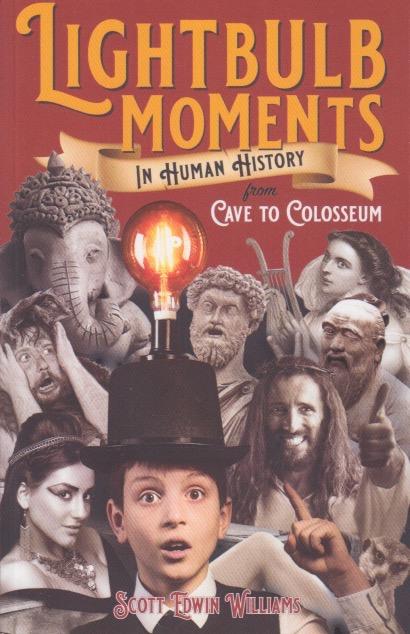
Optimism is a rare commodity these days. Reading Scott Edwin Williams’ new book, Lightbulb Moments in Human History: From Cave to Colosseum, served to remind me of that. The first of a projected three volumes, Williams’ book frames this rather like some of the other big picture attempts to summarize human history in a thousand pages or less, such as those of Yuval Noah Harari or Rutger Bregman. In outlook he’s closer to Bregman, who unabashedly states that we have progressed—things are better than they used to be. To explore this, in a (in his own words) smartass way, Williams has divided early human history into four main areas: STEM, religion, education, and culture. This framing device isn’t heavy-handed, but it is interesting to see religion included, and not always negatively.
We live in an era when those I regularly talk to (admittedly a small group), generally feel pessimistic about where we are. A good deal of that is because, as Williams rightly points out, we look at the small picture. Yes, we have big problems such as Trump, Musk, Russia’s ambitions in Ukraine, and global warming. Yes, people are suffering and dying needlessly. If, however, we take a step back, things are far better for far more people now than they ever have been. That doesn’t mean we don’t have big problems to solve—mostly spawned by capitalism and patriarchy—but if people follow historic trends, we may well end up in a better place. Historians won’t take Williams’ book seriously—and indeed, he tries to inject quite a bit of humor along the way—but books that remind us to compare where we are with where we have been can provide much needed optimism. Hope still huddles in Pandora’s box.
I was glad to see Williams including religion in his four keys areas to explore. I am convinced that he doesn’t devalue any people in the world (the book covers prehistory, ancient Mesopotamia, Egypt, China, India, Meso-America, Greece, and Rome) but his chapter on Christianity is a bit of an outlier. Although it’s not intentional, his “God of the Old Testament” versus “God of the New Testament” paradigm could been seen as antisemitic. Again, I’m sure Williams doesn’t intend it that way, but those of us who have studied, and continue to study the history of religions realize that that model has been used to justify nefarious plots in the past. Throughout the whole, Williams pokes fun at Erich van Däniken who influenced a young Williams just like he influenced a young me. And growing up requires leaving some things behind, while nevertheless learning something from them.
